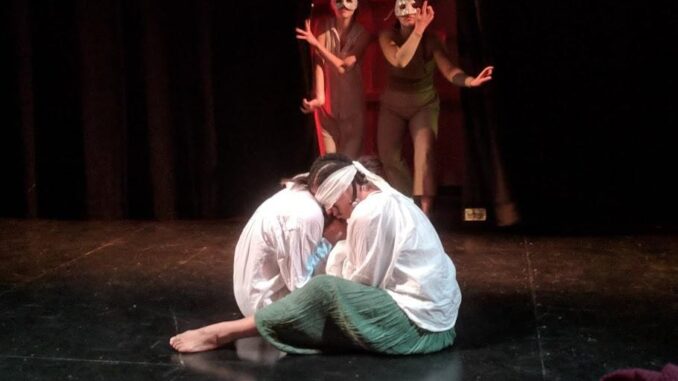
The theater department at New Paltz will showcase a rendition of the production of “La Fuerza de Antígona” on Nov. 11. The play is a bilingual adaptation of the Greek tragedy “Antigone” — it’s partly in English and partly in Spanish. “La Fuerza de Antígona,” which translates to “The Force of Antigone,” was written by Mexican-American playwright Tlaloc Rivas. It will be showcased at the McKenna Theater until Nov. 21.
Theater program chair Ken Goldstein says, “We [the theatre department] are honestly committed to changing the voices that we promote in the production season.” The faculty committee has promised to represent voices that are historically suppressed, which is one of the many reasons they chose to bring a bilingual adaptation like “La Fuerza de Antígona” to life.
Although rumors spread, including the Oracle reporting, that the play was unfairly going on with no representation of people who spoke Spanish, it then came to light that those accusations were untrue. Further, playwright Rivas says even if there were no Latinx actors or Spanish speakers, the play should still go on.
“There are members of the cast who do speak Spanish — and there are others who are making the effort to do so, just like any other project that involves Shakespeare/or accents,” Rivas said in a statement he made to the Department of Theater Arts regarding the last Oracle coverage of the piece. “How many other institutions try to do even the bare minimum? I can count with one hand…”
Rivas highlights the fact that uplifting marginalized voices cannot always mean casting a group of actors who identify with the experiences, especially in a predominantly white institution. Not having diverse actors also cannot mean not telling diverse stories.
“Above all else, anyone should be able to produce work from historically marginalized voices, especially at a learning institution. We’re all trying to grow, walk in other people’s shoes,” playwright Rivas wrote in a statement to the department of theater arts, combatting the idea that the play should only go on if it had a bilingual, Latinx cast.
The cast is diligently working to tell this story in a most authentic manner. Some of the cast members are learning Spanish to fulfill their roles’ requirements. “Antigone” is a classic tale about justice and Goldstein says, “La Fuerza de Antígona” is important especially “in this political and social climate, particularly for our community of students that are so invested in social justice and across campus.”
In this way, not only is “La Fuerza de Antígona” going to be a relevant story for audiences, but a relevant learning opportunity for justice-minded student performers.
Not only do the productions continue to strive for diversity and inclusivity, but the whole curriculum continues to evolve as well. The theatre classes center on “voices outside of the Eurocentric canon.” Goldstein explained what he expected the theatre program to accomplish in the future, saying,“we [as a SUNY school] have a moral and ethical obligation to serve the state of New York and the population of the state of New York.”
To watch the production, which will have its opening show next week, get tickets on the Performing Arts website.
